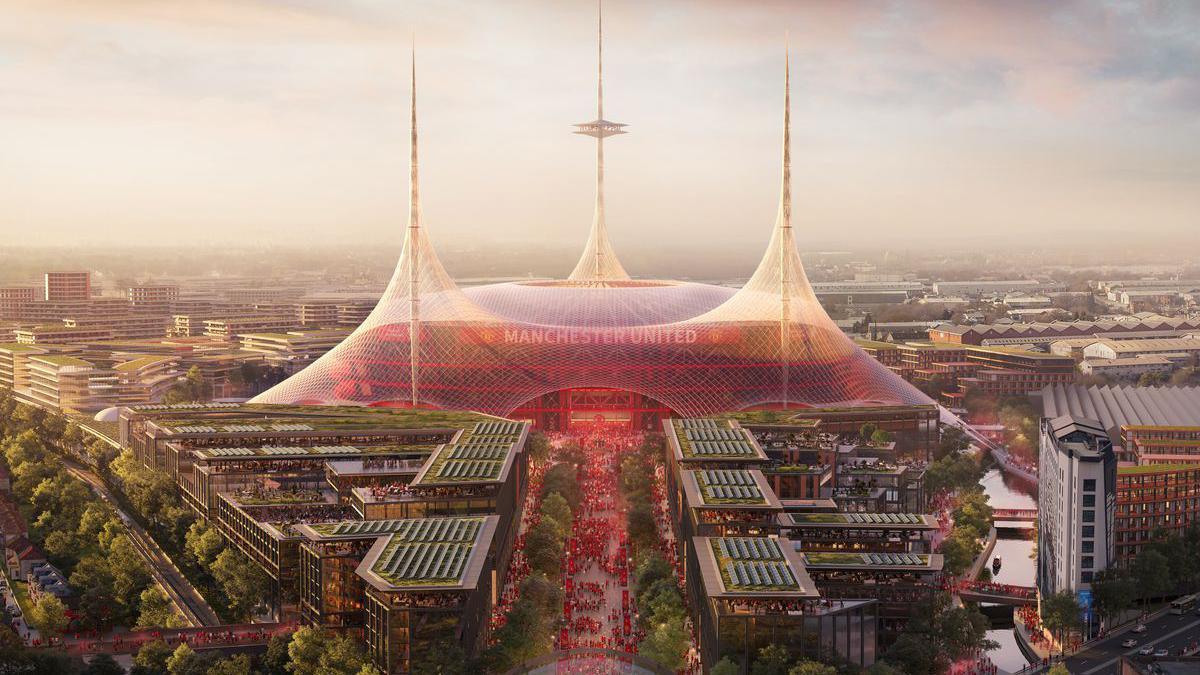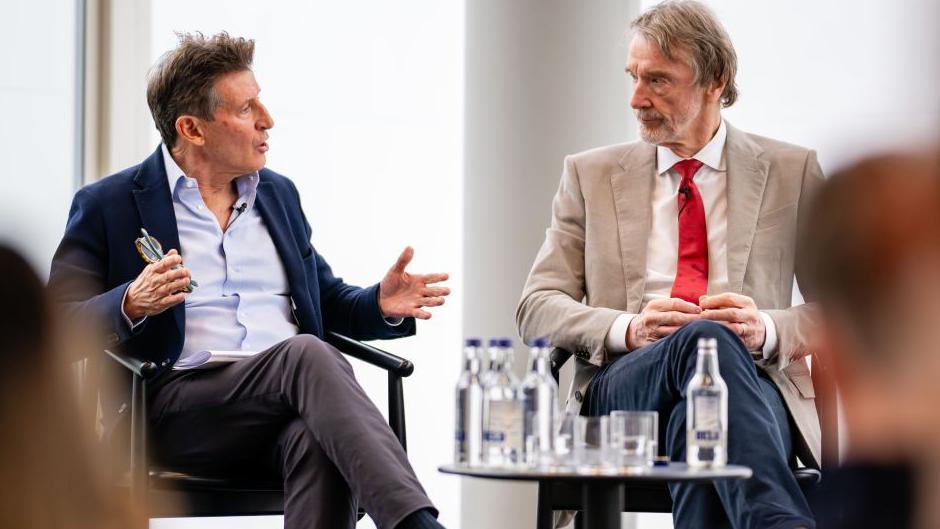Man Utd want to host 2035 Women's World Cup final

Images of what the new stadium and surrounding area could look like were unveiled in March
- Published
Manchester United want to host the 2035 Women's World Cup final in their new 100,000-seater stadium.
The club announced plans to build the biggest stadium in the UK - an "iconic" new £2bn ground close to Old Trafford - in March.
And they still hope to realise co-owner Sir Jim Ratcliffe's desire for a 'new' Old Trafford to be completed within five to six years - despite widespread doubts outside the club over the likelihood of hitting that timescale.
The 2035 Women's World Cup is expected to be held across the four nations of the United Kingdom, which is the sole bidder.
The Football Association is working on a bid to present to football's world governing body Fifa by the end of the year, setting out its vision for the tournament.
Club sources say they anticipate the new stadium being open a long time before 2035 and believe Ratcliffe's stated timescale from his March announcement is still valid.
But they also acknowledge the potential for delays around such a complex plan.
The club's ambition was announced as Lord Coe was named as Chair-Designate of the Mayoral Development Corporation for the Old Trafford Regeneration project, a move which Manchester United have welcomed.
He was previously the chair of the Old Trafford Regeneration Task Force set up by Ratcliffe last year to examine the feasibility of a new 100,000-capacity stadium for United, the first drawings for which were unveiled in London almost four months ago.
He has also chaired London's successful 2012 Olympic and Paralympic bid.
United chief executive Omar Berrada said: "The continuity it brings for the wider project will be a huge positive.
"In addition, Lord Coe's proven leadership and track record in delivering transformational projects will be invaluable as we work together to turn our collective vision into reality."
UK set to host 2035 Women's World Cup as only 'valid' bid
- Published3 April
Man Utd plan to build 'iconic' £2bn 100,000-capacity stadium
- Published11 March
Challenges facing 2030 completion date

Lord Coe (left) will oversee a wider regenration project across Manchester
Industry and football experts outside Old Trafford have identified numerous reasons why completion in 2030 may be unlikely, with one saying privately if the spades are in the ground within two years, United will have done very well.
Early discussions over how to fund the £2bn project have begun, although this is being done at the same time as the club are in negotiations over the refinancing of significant chunks of United's current debt.
While those specific loans are not set to expire until 2027, informed sources say they need to be refinanced a year before that. In their latest financial statement in June, United confirmed £327.9m of its 'senior secured notes' and £180m of its revolving credit facility is set to mature on 25 June 2027.
It is thought highly unlikely United will look to load its stadium debt on to that sum at a time when global interest rates are rising.
Ratcliffe and co-owners the Glazer family have the option of putting in the sums themselves, or reducing their stake in the club through a share sale, but neither of these options are felt to be realistic either.
Outsiders think the most likely option is having a subsidiary company own the stadium, which could bring in investment.
Yet others feel the economics of building a 100,000-capacity stadium from scratch requires the men's first team to be a far more attractive proposition than they are now because a significant number of corporate tickets will have to be sold to make it financially viable.
A secondary complication is whether there is a possibility of being able to buy nearby land currently being used for the Freight Liner terminal.
There is still time to tone down some of the more expensive elements of the vision Ratcliffe unveiled in March.
United's chief operating officer Collette Roche will lead the club's drive on the project, with fan focus groups set to discuss key aspects, including seating and pricing options, in a series of meetings next week.
It is not known yet when planning permission will be submitted, although issues such as transport expansion will be dealt with at local government level, with United's input.
"This is about so much more than just a stadium," said Lord Coe.
"It's about listening to and working with residents to create a vibrant, inclusive district, with high quality housing, green spaces, world class leisure and education facilities, and improved transport links.
"Twenty years on from securing the Olympic and Paralympic Games for this country, I'm ready to help deliver a vision of equal scale and ambition. I can't wait to get started."